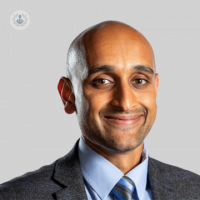Knee replacement surgery: All you need to know
Written in association with:Knee replacement surgery, also known as knee arthroplasty, is a common procedure aimed at improving the quality of life for those experiencing severe knee pain and limited mobility. For many, it offers a new lease on life by restoring function and reducing discomfort. If you or a loved one are considering this surgery, it’s important to understand the process, what to expect, and how it can benefit you.
Leading consultant orthopaedic surgery Mr Akash Patel explains all you need to know about the surgery.

Why might someone need a knee replacement?
The primary reason for knee replacement surgery is severe pain and stiffness in the knee joint, often caused by arthritis. Osteoarthritis, the most common form, occurs when the cartilage that cushions your knee wears away, leading to bone-on-bone contact. This can result in pain, swelling, and a restricted range of motion. Other conditions such as rheumatoid arthritis, which involves inflammation of the joint, or injuries like fractures can also necessitate this surgery.
For many patients, non-surgical treatments like medication, physical therapy, injections or lifestyle changes are effective initially. However, when these measures no longer provide relief, and daily activities become difficult or impossible, a knee replacement may be recommended.
What happens during the procedure?
Knee replacement surgery involves removing the damaged parts of the knee joint and replacing them with artificial components made of metal or plastic. These components are designed to replicate the movement and function of a natural knee.
The procedure typically takes one to two hours and is performed under anaesthesia. The surgeon makes an incision over the knee, removes the damaged tissue, and carefully fits the artificial components. The new joint is secured in place, and the incision is closed with sutures or staples.
What is recovery like after surgery?
Patients usually stay in the hospital for 24 to 48 hours to ensure their pain is well-managed and to begin physiotherapy. Physiotherapy is essential for restoring strength and movement in the knee.
Most patients can resume light activities within six weeks. However, full recovery may take up to 12 months, usually less. It’s essential to follow your rehabilitation plan, which may include exercises to improve flexibility and walking with support such as crutches or a cane.
Are there risks involved?
As with any surgery, knee replacement carries some risks, including infection, blood clots, or stiffness in the joint. However, advancements in surgical techniques have significantly reduced complications, and most patients experience successful outcomes.
Your surgeon will discuss your medical history and any factors that might increase risks, such as obesity or other chronic conditions, to ensure you are a good candidate for the procedure.
Is knee replacement right for you?
Deciding whether to undergo knee replacement surgery is a personal decision that depends on the severity of your symptoms and how they affect your quality of life. Consulting with your doctor and asking questions can help you make an informed choice about this life-changing procedure.
If you require knee replacement surgery and would like to book a consultation with Mr Patel, do not hesitate to do so by visiting his Top Doctors profile today.


